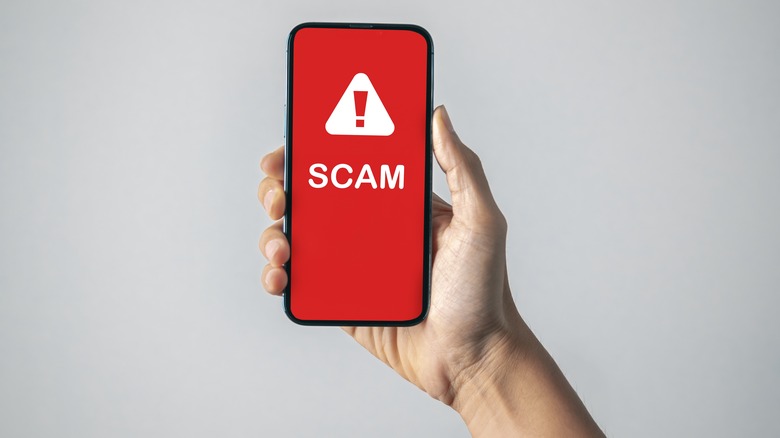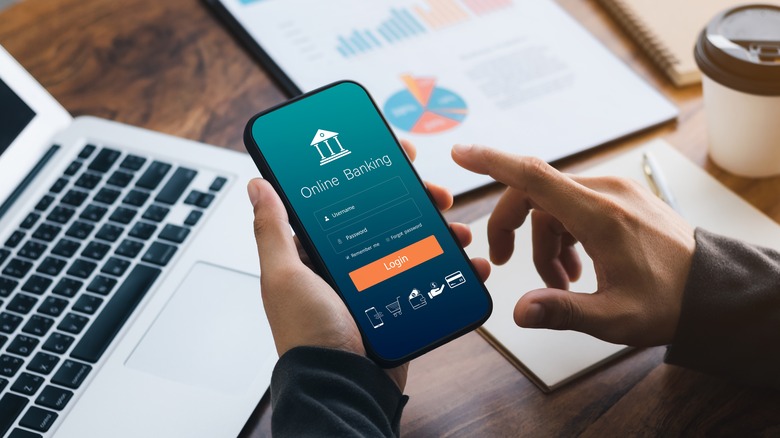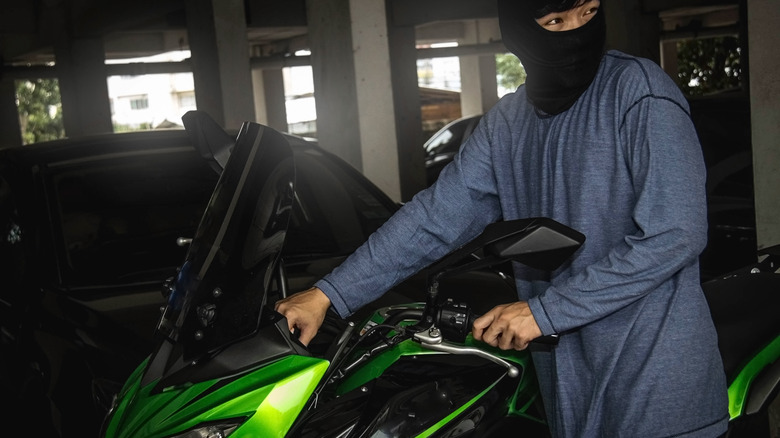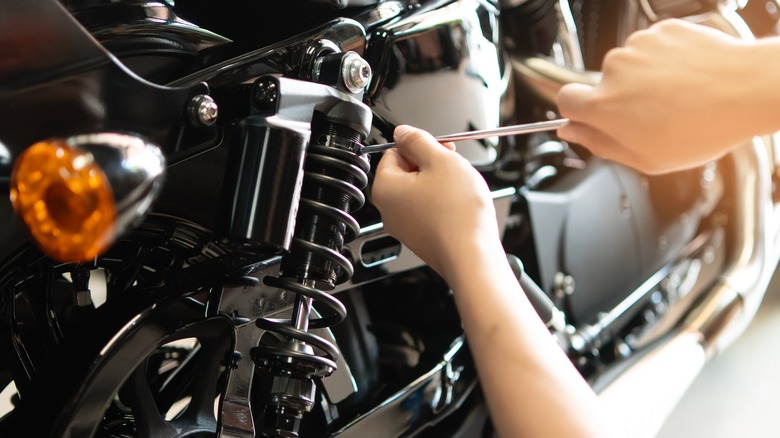
dennizn/Shutterstock
If you’re in the market for a pre-owned motorcycle at a price that beats dealership rates, Craigslist can seem like the perfect place to search. The website has numerous listings at any given point in time (this can vary based on where you reside, of course), and, more importantly, you don’t have to deal with a salesperson who is constantly trying to upsell you. Even if you’re new to the platform, you can find plenty of tips to navigate the site and find suitable cars and motorcycles quickly. When you eventually come across a motorcycle that matches your needs, you can negotiate the price with the seller, schedule a test ride, and sign the dotted line to complete the purchase. All in all, purchasing a motorcycle through Craigslist can be quick and budget-friendly if everything goes according to plan.
Unfortunately, not everyone has a positive experience when shopping on Craigslist. Although the platform has numerous legitimate listings, many unsuspecting buyers fall victim to scams. Even if you are extremely savvy and budget-conscious, certain scams are hard to spot, especially if this is your first time purchasing something of value on the platform. To help you confidently navigate the Craigslist marketplace and spot scammers and criminals, we’ve compiled a list of the most common scams you should watch out for.
Fake listing scam

Kitinut Jinapuck/Shutterstock
Fake listing scams involve fraudulent sellers creating listings with photos of motorcycles they don’t possess. Typically, scammers will steal the product description and photos from a legitimate listing posted either on Craigslist by an actual seller located elsewhere or from an ad on another website. Since the photos and description look legitimate, buyers assume they’re dealing with an actual seller and will try to close on the sale as soon as they can.
Something you need to know before buying a used motorcycle on Craigslist is that the platform doesn’t verify the authenticity of its listings. So, the onus is on the buyer to look for red flags. Fortunately, this is pretty easy to do if you know what to look for. One telltale sign of a fake listing is an unusually low advertised price. Given this, before you get excited over a potentially great deal and start engaging with the seller, check the price of the motorcycle on sites like Edmunds and Kelley Blue Book. If the advertised price on Craigslist is significantly lower than what it should be, it’s best to walk away and resume your search.
Another way to tell if a listing is fake is to do a reverse image search of the photos provided by the seller. If this leads you back to the original listing (which, in all likelihood, has a different price) or you come across multiple listings by the same seller in different cities, you’re likely dealing with a scammer. The best thing to do, in this case, would be to report the scam to Craigslist and move on.
Deposit to hold the motorcycle scam

Thapana_Studio/Shutterstock
Scammers who use this tactic create motorcycle listings and price them below market value to get the attention of prospective buyers. An unsuspecting buyer who comes across such a listing will express their interest and begin engaging with the seller. But instead of allowing you to schedule a time to physically inspect the motorcycle and take it for a test ride, the seller will tell you they’re seeing a lot of interest in the motorcycle and will need a deposit from you to take it off Craigslist and hold it until you’ve checked it out.
The deposit might not be substantial enough to raise immediate suspicion and might even seem like a reasonable request, given the popularity of the motorcycle. However, once you pay the deposit, the scammer will disappear and possibly take their ad down, leaving you without your money or the motorcycle. To avoid falling victim to this type of scam, begin a conversation with the seller, but never pay a deposit until you’ve had a chance to inspect the motorcycle in person, take it for a test spin, and get the seller to sign the bill of sale.
If the seller insists on you paying a deposit before you see the motorcycle, skip the deal and continue your search. Keep in mind that there are numerous legitimate listings on the platform, so it’s best not to rush the process. If you don’t find a suitable used motorcycle on the site, a little bit of research might even lead you to a cheaper, brand-new motorcycle from a different brand.
Stolen bike scam

chalermphon_tiam/Shutterstock
Con artists may rent a motorcycle and post an ad for it online, posing as the seller. Alternatively, they may tell you they’re handling the sale of the motorcycle for a friend or relative. Unfortunately, this type of scam is harder to identify until the very end since the seller usually encourages the buyer to come down, inspect the bike, and even take it for a test ride. If you agree to purchase the motorcycle, the scammer might ask you for a deposit or request you to pay in cash.
Expectedly, the sale either won’t go through, or you’ll discover that you’ve been duped when registering the vehicle. Avoid wasting your time and money by asking to see the bill of sale, title, and all service records before you move too far along the process. Typically, scammers will try to put this off for as long as possible to avoid getting caught. If the seller you’re dealing with is delaying sharing these details, there’s a chance you’re dealing with a scammer.
Dealers posing as private sellers scam

Nestor Rizhniak/Shutterstock
To protect the interests of automobile buyers, the Federal Trade Commission (FTC) has put into effect certain rules that registered dealerships need to follow. For instance, dealers aren’t allowed to make misrepresentations about the condition of a vehicle or its price. The catch is that these rules only apply to dealerships and not to private sellers. Unscrupulous dealers may, thus, pose as private sellers on Craigslist to evade these regulations. The goal, in this case, is to mislead unsuspecting buyers by sharing inaccurate details about the motorcycle’s condition and history and making a quick buck.
To prevent this from happening, insist on seeing and test-driving the motorcycle before you make any full or partial payment. If you can, ask a reliable mechanic to join you so they can inspect the vehicle for signs of damage or major repairs that might not be apparent to the untrained eye. Additionally, ask to see the motorcycle’s title and verify that the name on this document matches that of the seller.
Minor fixes needed scam

kasarp studio/Shutterstock
When browsing Craigslist, you might stumble upon real bargains from time to time. When you read the description, you’ll notice that the seller has stated that the motorcycle requires minor fixes, like removing rust from the chains. While an issue like this might seem pretty easy and inexpensive to fix on your own, it warrants scrutiny.
In cases of fraud, the seller’s initial claim is often misleading and might conceal more significant issues. For instance, rust on the chains could indicate that the motorcycle has not been maintained or that the structural integrity of the links is compromised, which can be extremely dangerous for the rider. Given this, always take a mechanic with you to inspect the bike for signs of extensive damage. This might cost you some money upfront, especially if you decide not to purchase the motorcycle, but it’ll keep you from spending thousands of dollars on a lemon.